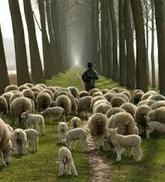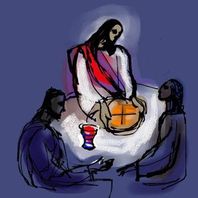
— Dietrich Bonhoeffer
READING:
When they finished eating, Jesus asked Simon Peter, “Simon son of John, do you love me more than these?” Simon replied, “Yes, Lord, you know I love you.” Jesus said to him, “Feed my lambs.” Jesus asked a second time, “Simon son of John, do you love me?” Simon replied, “Yes, Lord, you know I love you.” Jesus said to him, “Take care of my sheep.” He asked a third time, “Simon son of John, do you love me?” Peter was sad that Jesus asked him a third time, “Do you love me?” He replied, “Lord, you know everything; you know I love you.” Jesus said to him, “Feed my sheep.
- John 21.15-17 (CEB)
REFLECTION:
A friend recently shared with me that while most of us claim to harbor God's love in our hearts, that love is worthless unless we give it expression. Unless, that is to say, it flows through our lives into the lives of others. You know, into the lives of those pesky neighbors Jesus was always on about! My friend’s sentiment rang true to the life and message of Jesus, which I found mystifying, since my friend is Muslim. This twist in the conversation brought the words of Thomas Aquinas to mind, "One may never have heard the sacred word “Christ,” but be closer to God than a priest or nun." But that is not my point, so I will move on.
If we love God we will reach out to our neighbor to offer nurture and nourishment; or, to use the language of the New Testament, we will feed God's sheep. Fair enough; but what does that mean? What do we have to offer? Peter must have been haunted by that question as time and again Jesus challenged him to show his love for the risen Lord by feeding his sheep. What do we have to offer our neighbors? It is the same for us in our day as it was for Peter back in the day: address their needs; share from our bounty; offer personal, material, and spiritual support.
I must admit, that challenge makes me nervous, especially with Thanksgiving just around the corner. You see, I want to have that choice drumstick all to myself at the family feast, just as my cousin Richard used to manage (every year! Thanksgiving and Christmas.) I want to sit down at the thanksgiving table, thank God for the many blessings in my life, then keep them all for myself (especially that choice piece of turkey!) But - no - I'm supposed to share, just as Peter was to share. And If that’s not enough, Dietrich Bonhoeffer offered his two cents on the issue. “It is our daily bread that we eat,” he said, “not my own. We share our bread.“ I’ll have to admit, this is not a bad reminder as we approach the season of gratitude.
So, how do we express our love for God; how do we offer thanks for our many blessings? By feeding God's sheep, as Peter learned. Ann Weems seems to have learned this lesson, and speaks of it in a poem entitled Feeding Sheep. Perhaps if we interlace her words with Peter' story we will get a clear sense of what we should do next week:
When they finished eating, Jesus asked Simon Peter, “Simon son of John, do you love me more than these?” Simon replied, “Yes, Lord, you know I love you.” Jesus said to him, “Feed my lambs.” He said, “Feed my lambs.” There were no conditions… Jesus asked a second time, “Simon son of John, do you love me?” Simon replied, “Yes, Lord, you know I love you.” Jesus said to him, “Take care of my sheep.” He said, “Take care of my sheep… feed my sheep.” There were no conditions… Least of all, feed my sheep if they deserve it. Feed my sheep if you feel like it. Feed my sheep if you have any leftovers. He asked a third time, “Simon son of John, do you love me?” Peter was sad that Jesus asked him a third time, “Do you love me?” He replied, “Lord, you know everything; you know I love you.” Jesus said to him, “Feed my sheep.” No conditions… just, “Feed my sheep.” Could it be that God’s Kingdom will come when each lamb is fed? We who have agreed to keep covenant are called… to feed sheep.
No conditions, just feed my sheep. No conditions, but I still have one question; may I please have the drumstick?


 RSS Feed
RSS Feed



